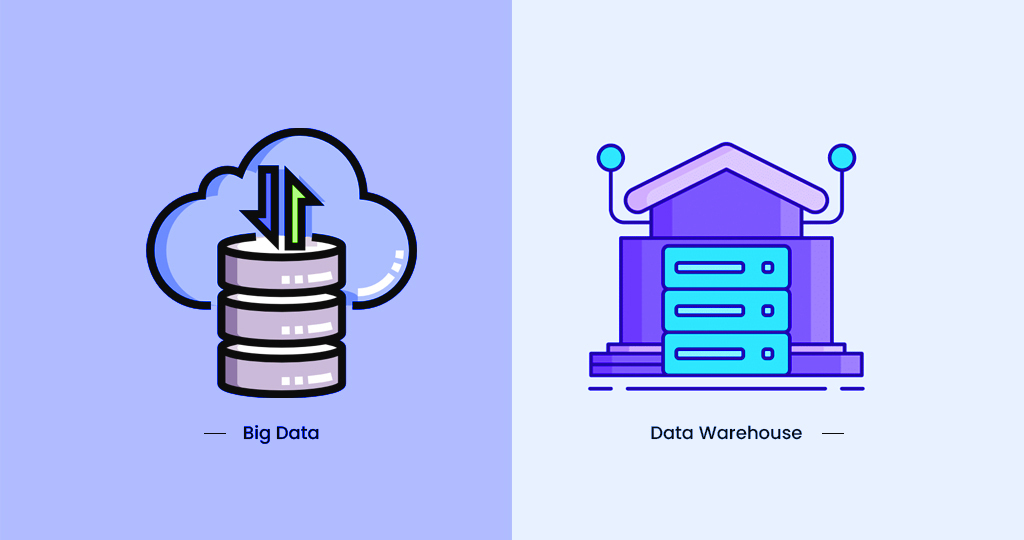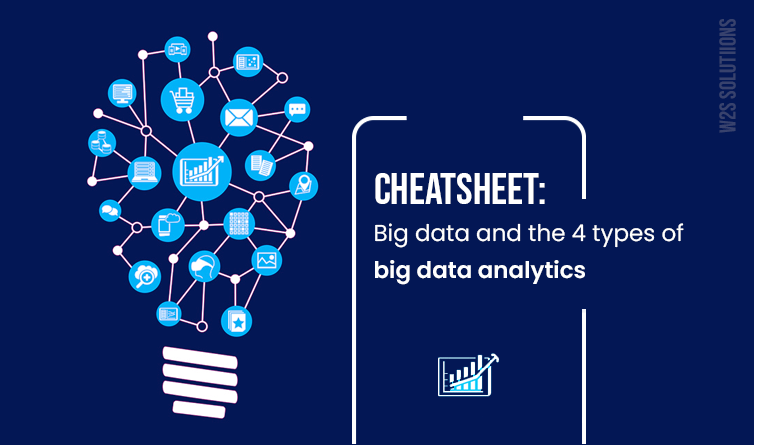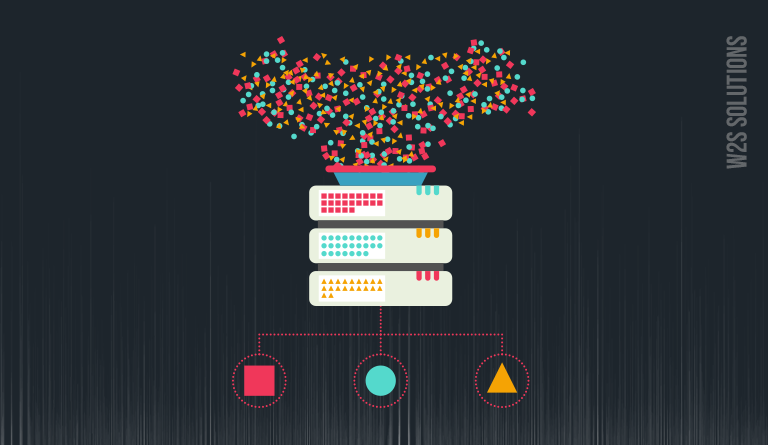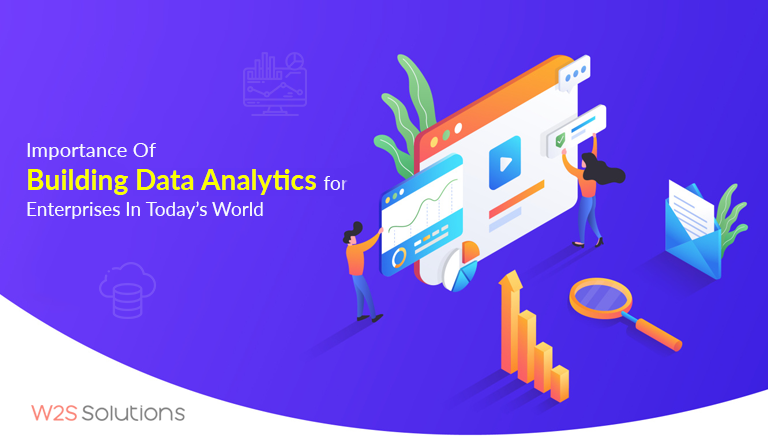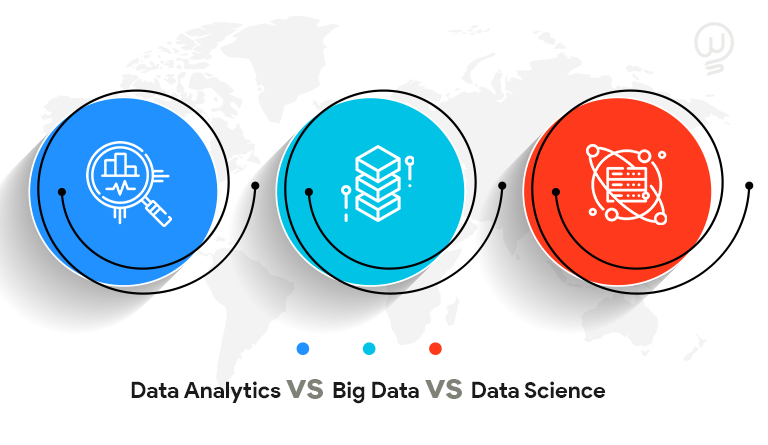TABLE OF CONTENT
When big businesses were looking for an effective way to store their data not too long ago, data warehousing was the answer. A few years later, big data entered the scene, with some significant industry players speculating that it might eventually displace legacy data warehouses.
But when you examine big data and data warehouse technologies closely, you find that they have a lot in common. To begin with, both of them are capable of reporting and can store enormous amounts of data. This raises the question of how different they are and whether big data will eventually replace data warehouses. Let’s not waste a moment and understand the differences between big data and data warehouses.
What is Big Data and a Data Warehouse?
Big Data simply refers to the data that is of large volume and consists of complex data sets. This large amount of data may be structured, semi-structured, or non-structured and cannot be processed by traditional data processing software and databases. Several processes like analysis, manipulation, changes, etc. are performed on this set of data, and then it is utilized by companies to make informed decisions. Big data poses a very valuable resource in today’s world. Big data can also be used to solve business issues by offering wise decision-making.
The accumulation of data from multiple different sources is basically what makes up a data warehouse. The primary part of the business intelligence system is where data analysis and management are carried out in order to enhance decision-making. Providing the data for analysis involves the processes of extraction, loading, and transformation. Large amounts of data can also be queried using data warehouses. It makes use of information from application log files and various relational databases.
Big Data vs Data Warehouse: Key Differences Explained
Structured, Semi-Structured, and Unstructured in Big Data vs Data Warehouse
Big Data:
Big data encompasses a wide range of data types and formats, including structured, semi-structured, and unstructured data. Big data technologies are designed to handle these large and diverse datasets, allowing organizations to extract valuable insights from sources like social media, sensors, and more. The focus of big data is on the ability to store, process, and analyze this data efficiently.
Data Warehouse:
Data warehouses, on the other hand, primarily deal with structured data. They are tailored for data that is well-organized, often sourced from transactional systems like databases, and typically used for business intelligence and reporting. Data warehouses provide a structured and organized environment for historical data storage.
Purpose and Architecture
Big Data:
Big data technologies are primarily concerned with providing scalable storage and processing solutions for massive datasets. The architecture of big data systems often involves distributed file systems, parallel processing, and clusters of commodity hardware. These systems are designed to handle a high volume of data and are well-suited for tasks like real-time data analysis, machine learning, and data exploration.
Data Warehouse:
Data warehouses are architectural constructs designed to facilitate the organization, integration, and retrieval of historical data for business intelligence and reporting purposes. They are characterized by their structured design, optimized for efficient querying and analysis. Data warehouses are not just about technology but also involve data modeling and ETL (Extract, Transform, Load) processes to ensure data quality and consistency.
Input Data Types
Big Data:
Big data systems are known for their flexibility in handling various data types. They can ingest structured, semi-structured, and unstructured data from a wide array of sources. This flexibility makes them ideal for scenarios where data sources are diverse and continuously evolving.
Data Warehouse:
Data warehouses are primarily designed for structured data. They are less flexible when it comes to handling unstructured or semi-structured data. Data warehousing solutions are optimized for relational data models and may require significant preprocessing to accommodate other data types.
Processing Approach
Big Data:
Big data systems employ distributed file systems and parallel processing techniques to analyze and process data at scale. They are built to handle both batch and real-time processing, making them suitable for a wide range of data processing tasks.
Data Warehouse:
Data warehouses typically do not use distributed file systems for processing. They rely on structured query language (SQL) for data retrieval and analysis. Data warehouse systems are optimized for complex SQL queries, making them well-suited for reporting and analytics.
Query Language
Big Data:
Big data systems use specialized languages and tools for data manipulation and analysis. They often utilize query languages like HiveQL (for Hive) or Pig Latin (for Apache Pig) that are tailored to the specific data processing framework.
Data Warehouse:
SQL queries are the standard means of extracting and manipulating data from data warehouses. Data warehouse platforms provide robust support for SQL, making it easy for analysts and business users to interact with the data using familiar query language constructs.
Tools and Technologies
Big Data:
Big data technologies include Apache Hadoop, Apache Spark, and various NoSQL databases. These tools are designed to work in distributed computing environments and can scale horizontally to accommodate the ever-increasing volumes of data.
Data Warehouse:
Data warehousing solutions often revolve around relational database management systems (RDBMS) like Oracle, SQL Server, or specialized data warehousing platforms like Snowflake and Amazon Redshift. These systems are optimized for structured data storage and analytics.
Impact of Data Changes
Big Data:
In big data systems, when new data is added or changes occur, these changes are typically stored in the form of files or events. These changes do not directly impact the existing data and can be processed separately.
Data Warehouse:
Data warehouses are less agile when it comes to incorporating changes in data. They require careful data integration processes, including ETL pipelines, to ensure that changes are correctly integrated without disrupting existing data structures.
Managing Big Data vs Data Warehouse
Big Data:
Managing big data systems involves dealing with the complexities of distributed computing, data storage, and processing at scale. While these systems are powerful, their management focus is often on infrastructure and scalability, making them more suitable for organizations with substantial technical resources.
Data Warehouse:
Data warehouses demand efficient data modeling, ETL processes, and governance due to their historical and structured nature. Managing data quality and consistency is a critical aspect of data warehouse management. This makes data warehousing solutions more suitable for organizations with a strong emphasis on data governance and structured reporting.
Big data and data warehouses serve different purposes and are optimized for handling distinct types of data. Big data focuses on scalable storage and processing of diverse and massive datasets, while data warehouses are tailored for structured historical data and business intelligence needs. Understanding these key differences is essential for choosing the right solution for specific data management and analysis requirements.
Will Big Data Replace Data Warehouses? Future Outlook and Insights
While big data and data warehouse technologies may appear similar at first glance, a closer examination reveals significant differences across various aspects. These distinctions are especially evident when considering the vast and continuously growing volume of data generated by organizations and the increasing demand for real-time analytics and insights. Consequently, many organizations are gravitating toward big data solutions instead of traditional data warehousing.
However, it’s essential to recognize that the question of whether big data will entirely replace data warehouses remains uncertain. At W2S Solutions, we specialize in providing cutting-edge data engineering and data analytics services. We understand that in the evolving world of data management, businesses require tailored solutions that can harness the power of both big data and data warehousing. Our expertise lies in crafting comprehensive data strategies that leverage the strengths of these technologies to empower organizations with actionable insights, ensuring they remain competitive and relevant in the modern data-driven world.
Frequently Asked Questions
Get inspired!
Subscribe to our newsletter and get updates on how to navigate through disruption and make digital work for your business!
